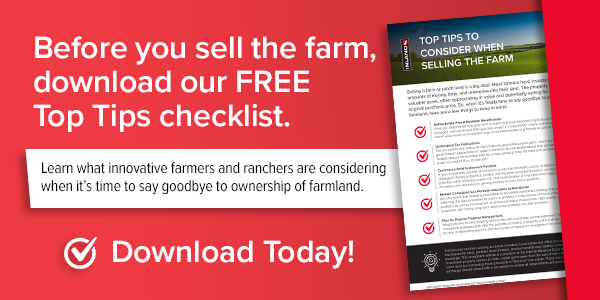Looking for a family succession plan? A 1031 exchange is a powerful estate planning tool to consider.
If you are reaching the age where the concept of retirement is either becoming more appealing or necessary, you are in good company. According to the USDA’s most recent data, of the 3.4 million farmers in the U.S., one third are over age 65, and almost a million more are within ten years of that age.1
With aging farmers comes a discussion about retirement options. There are a host of questions you will need to address as you think about a transition into retirement. Where will you live? Who will succeed you? How will you fund this stage of your life? What about estate planning? The answers to those questions, and others, may become the framework of your retirement plan.
It Starts with a Plan
“Of the 17% of all principal [farm] operators who plan to retire in the next five years, more than 60% do not have a succession plan or have not yet identified a successor.”2 - USDA.gov
The USDA’s research indicates that an aging farmer population may not adequately be prepared for retirement, and you might find yourself in that situation. That is understandable, considering just a few of the difficult decisions you face when transitioning ownership of the family farm.
-
First and foremost, you will need to define a plan for how you will retire. For example, will you continue to farm on a reduced basis as you slowly transition into retirement, or will you define a specific date where you will no longer be involved? The emotional decision to “leave it all behind” can be haunting as your identity and most of your life experiences are woven into the land you have stewarded over a lifetime.
-
Next, you need to have a succession plan. Do you wish to keep the farm in your family, and do you have an heir or heirs who take over as the next generation? If so, you need to address how ownership will be held, especially if you have off-farm heirs who will not be farming the land. A well-defined estate plan is essential to help avoid any conflicts or misunderstandings among heirs.
-
You will also need a comprehensive financial plan. You may have saved money along the way in an IRA, or you might own an annuity or life insurance product that could be sources of income to complement any Social Security payments. But clearly, a great portion of your assets is your farm, and the value you could receive from a sale may be a primary source of your retirement income. So how will you invest those proceeds?
The 1031 Exchange
We mentioned in a previous post that many retiring farmers – especially those whose heirs will not continue the farming tradition – are utilizing a 1031 exchange to reinvest proceeds if they sell their farms. There are several reasons why.
Section 1031 of The Internal Revenue Code enables you to sell your investment property and defer capital gains tax by reinvesting the proceeds from the sale into another property of equal or greater value that is deemed a “like-kind” property.
The “like-kind” definition is broad and generally means any “property held for productive use in a trade or business or for investments.” So, with a 1031 exchange, you can use the proceeds from the sale of your farm to invest in an apartment complex, a small industrial building, or even a retail store.
The most significant advantage of a 1031 exchange is the ability to defer taxes. If your farm has been in your family for generations, today’s appreciated value could easily be worth a million dollars or more. As a result, your tax liability could be large and would erode much of the proceeds needed to fund your retirement.
Another advantage of a 1031 exchange is the ability to invest your proceeds in a Delaware Statutory Trust (DST), a passive investment (no active management required on your part!) that generates income from investment-grade properties managed by professional investment managers.
We will discuss the tax advantages of the 1031 exchange and DST in upcoming posts. Still, we wanted to start the ‘retirement’ discussion with this brief overview of a few key considerations you may begin thinking about. We encourage you to speak with your financial professional, attorney, and tax consultant about your intentions, as their expertise will prove invaluable as you develop your plans.
Complete the form on the contact us page if you would like to learn more about 1031 exchange opportunities and how financial professionals work with investment sponsors to help farmers preserve family farm legacies. A representative will call you within 24-48 hours.
1https://thefern.org/ag_insider/on-average-u-s-farmers-are-aging-but-a-quarter-of-them-are-newcomers/
2https://www.ers.usda.gov/webdocs/publications/100012/eib-220.pdf?v=3021
